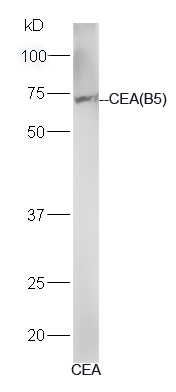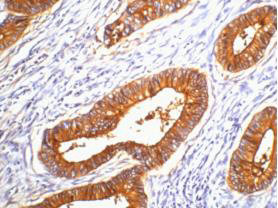![IHC-P analysis of human colon carcinoma tissue using GTX17254 CEA antibody [Col-1]. IHC-P analysis of human colon carcinoma tissue using GTX17254 CEA antibody [Col-1].](https://www.genetex.com/upload/website/prouct_img/normal/GTX17254/GTX17254_20191203_IHC-P_39_w_23060620_791.webp)
IHC-P analysis of human colon carcinoma tissue using GTX17254 CEA antibody [Col-1].
CD66e antibody[Col-1]
GTX17254
ApplicationsImmunoFluorescence, ImmunoCytoChemistry, ImmunoHistoChemistry, ImmunoHistoChemistry Paraffin
Product group Antibodies
ReactivityHuman
TargetCEACAM5
Overview
- SupplierGeneTex
- Product NameCD66e antibody[Col-1]
- Delivery Days Customer9
- Application Supplier NoteIHC-P: 1:75-1:100. *Optimal dilutions/concentrations should be determined by the researcher.Not tested in other applications.
- ApplicationsImmunoFluorescence, ImmunoCytoChemistry, ImmunoHistoChemistry, ImmunoHistoChemistry Paraffin
- CertificationResearch Use Only
- ClonalityMonoclonal
- Clone IDCol-1
- ConjugateUnconjugated
- Gene ID1048
- Target nameCEACAM5
- Target descriptionCEA cell adhesion molecule 5
- Target synonymsCD66e, CEA, cell adhesion molecule CEACAM5, carcinoembryonic antigen related cell adhesion molecule 5, meconium antigen 100
- HostMouse
- IsotypeIgG2a
- Protein IDP06731
- Protein NameCell adhesion molecule CEACAM5
- Scientific DescriptionThis gene encodes a cell surface glycoprotein that represents the founding member of the carcinoembryonic antigen (CEA) family of proteins. The encoded protein is used as a clinical biomarker for gastrointestinal cancers and may promote tumor development through its role as a cell adhesion molecule. Additionally, the encoded protein may regulate differentiation, apoptosis, and cell polarity. This gene is present in a CEA family gene cluster on chromosome 19. Alternative splicing results in multiple transcript variants. [provided by RefSeq, Jul 2015]
- ReactivityHuman
- Storage Instruction2°C to 8°C
- UNSPSC12352203
References
- Furuta T, Oda T, Kiyoi K, et al. Carcinoembryonic antigen as a specific glycoprotein ligand of rBC2LCN lectin on pancreatic ductal adenocarcinoma cells. Cancer Sci. 2021,112(9):3722-3731. doi: 10.1111/cas.15023Read this paper
- Stiekema A, Van de Vijver KK, Boot H, et al. Human epididymis protein 4 immunostaining of malignant ascites differentiates cancer of Müllerian origin from gastrointestinal cancer. Cancer Cytopathol. 2017,125(3):197-204. doi: 10.1002/cncy.21811Read this paper







